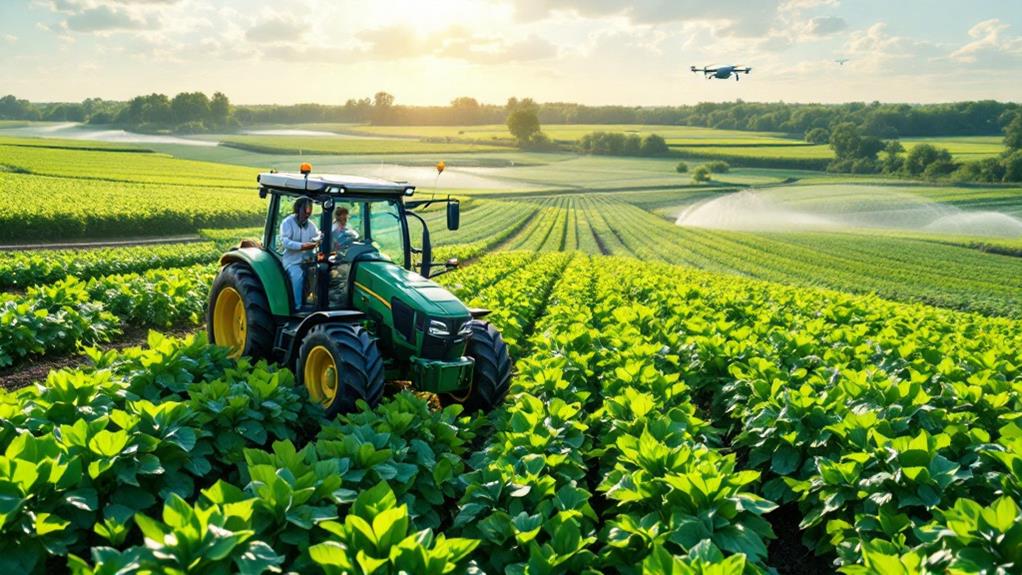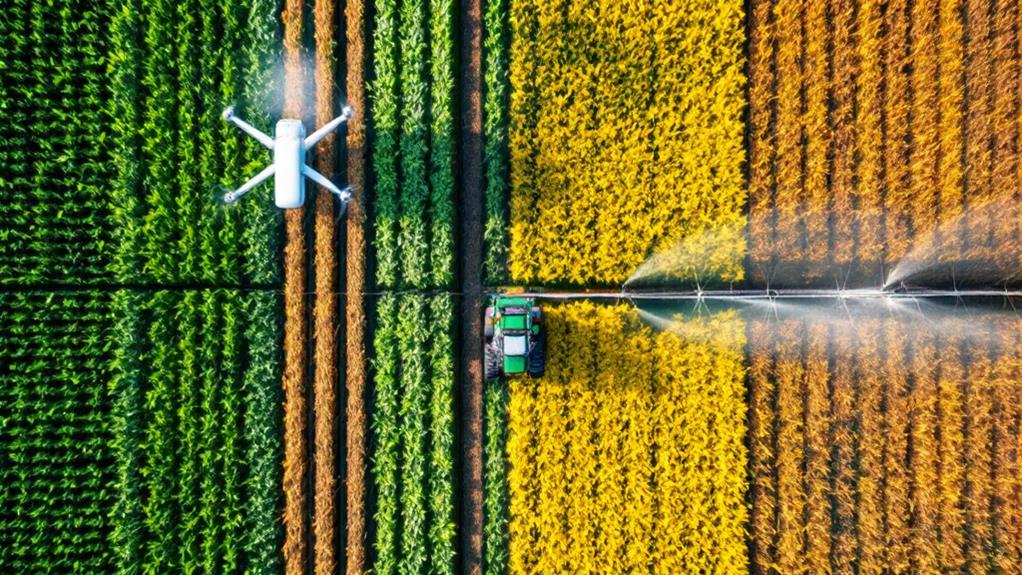An Introduction to Agricultural Sciences: Feeding the World Through Innovation

Agricultural sciences blend traditional farming wisdom with state-of-the-art research to address global food security. You'll find a focus on understanding plant growth, animal husbandry, and ecosystem management. Genetic engineering allows for precise crop modifications, while precision farming uses GPS and data analytics to optimize production. Sustainable practices like organic farming and conservation tillage minimize environmental impact. The future of agriculture includes climate-smart techniques, urban farming, and AI-powered systems. From soil management to lab-grown meat, agricultural innovations are revolutionizing how we feed the world. Exploring these advancements reveals a fascinating expedition towards a more sustainable and food-secure future.
Foundations of Agricultural Sciences
The foundations of agricultural sciences form the bedrock of modern food production. You'll find that these principles have evolved over centuries, combining traditional farming wisdom with cutting-edge research. At its core, agricultural science focuses on understanding plant growth, animal husbandry, and the intricate ecosystems that support them.
Soil management is a crucial aspect of this foundation. You'll learn how to analyze soil composition, pH levels, and nutrient content to optimize crop yields. This knowledge allows you to implement sustainable practices that maintain soil health and fertility over time.
Crop diversification is another key principle you'll plunge into. By cultivating a variety of plants, you'll reduce the risk of crop failure due to pests or diseases. You'll also uncover how crop rotation and intercropping can improve soil quality and increase overall farm productivity.
As you immerse yourself deeper into agricultural sciences, you'll encounter topics like irrigation techniques, pest management, and genetic modification. These advanced concepts build upon the fundamental understanding of plant biology and environmental factors that you'll develop early in your studies.
Genetic Engineering in Agriculture
Revolutionizing modern agriculture, genetic engineering has become a powerful tool in crop development and food production. You'll find that this technology builds upon traditional plant hybridization techniques, allowing scientists to make precise changes to a plant's DNA. By manipulating genes, researchers can create crops with desirable traits like disease resistance, improved nutritional content, and increased yield.
Genome editing techniques, such as CRISPR-Cas9, have further advanced the field. These methods enable scientists to modify specific genes with exceptional accuracy. You can now see crops that withstand harsh environmental conditions, require fewer pesticides, or produce higher quantities of essential nutrients.
However, genetic engineering in agriculture isn't without controversy. You should be aware of ongoing debates surrounding genetically modified organisms (GMOs) and their potential impact on human health and the environment. As you examine this topic, you'll encounter discussions about food safety, biodiversity, and ethical considerations.
Despite these challenges, genetic engineering continues to play a pivotal role in addressing global food security issues. It's a field that's constantly transforming, offering new possibilities for sustainable agriculture and improved crop varieties.
Precision Farming Technologies

Advancements in agricultural technology extend beyond genetic engineering to encompass precision farming techniques. These innovative methods allow you to optimize crop production by leveraging data-driven observations and cutting-edge tools.
You'll find that precision farming relies heavily on GPS technology, sensors, and advanced software to collect and analyze field data. This information helps you make informed decisions about planting, irrigation, and pest control. One key aspect is soil sampling techniques, which provide detailed information about nutrient levels and soil composition across your fields. With this knowledge, you can implement variable rate fertilization, applying the right amount of nutrients precisely where they're needed.
Precision farming also incorporates drones and satellite imagery to monitor crop health and identify problem areas quickly. You'll be able to detect issues like pest infestations or nutrient deficiencies early on, allowing for targeted interventions. Additionally, automated irrigation systems can adjust water distribution based on real-time soil moisture data, conserving resources and improving crop yields. By adopting these technologies, you'll increase efficiency, reduce waste, and ultimately produce more food with fewer inputs.
Sustainable Agricultural Practices
Sustainable agricultural practices have become increasingly essential in the current scene of rising food demands and environmental challenges. You'll find that these practices focus on producing food while minimizing environmental impact and conserving resources for future generations.
One key approach is organic farming, which avoids synthetic pesticides and fertilizers. Instead, you'll use natural methods like crop rotation, composting, and biological pest control. This helps maintain soil health and biodiversity while reducing chemical runoff.
Agroecological systems take sustainability a step further by mimicking natural ecosystems. You'll integrate crops, livestock, and native plants to create a balanced, self-sustaining farm. This approach enhances soil fertility, improves water retention, and promotes natural pest management.
Other sustainable practices include conservation tillage, which minimizes soil disturbance, and precision irrigation, which reduces water waste. You'll also find cover cropping beneficial for preventing erosion and improving soil structure.
Future of Food Security

As we look ahead, the future of food security hinges on our ability to adapt and innovate. You'll need to embrace new technologies and strategies to guarantee a stable food supply for a growing global population. Climate smart agriculture will play a pivotal role, helping you mitigate the impacts of climate change while increasing productivity.
Urban farming is another key component of future food security. You'll see more vertical farms, rooftop gardens, and community plots in cities worldwide. These initiatives won't just provide fresh produce; they'll also reduce transportation costs and emissions.
To visualize the future of food security, imagine:
- Drones monitoring vast fields, providing real-time data on crop health
- Lab-grown meat becoming a mainstream protein source
- AI-powered systems optimizing irrigation and nutrient delivery
You'll also witness the rise of precision agriculture, where farmers use data analytics and IoT devices to maximize yields while minimizing resource use. By adopting these innovative approaches, you'll help ensure that future generations have access to nutritious, sustainable food sources.



